Depending on who you follow, you can now go a few scrolls on your social media feeds without seeing anything referencing Black Lives Matter or the uprising against police brutality sparked by George Floyd’s death.
Your fave celebs are likely no longer talking about it. Many brands still have an “Our Commitment To Diversity” link on their website, but it’s no longer on the front page of their social media or emblazoned across a mandatory splash page click-through. As eviction protections and unemployment bonuses expire, millions of Americans are forced back into dangerous workplaces in order to survive — and as such, other than in Portland, L.A., and a few other major cities, local demonstrations have died down.
So is the movement over? Or is it just no longer trendy? Brands have calculated that explicitly supporting anti-racism is no longer the profitable move, and many white people have also decided that it’s no longer in their best social interest to publicly perform support of the movement. So, “back to normal,” it is.
“Performative” activism or allyship is what it’s called when people or organizations — like political parties or corporations — publicly trumpet their support of an activist movement through insincere, overt displays, typically at the barest minimum of effort. Posting a black square on Instagram or making a “commitment to diversity” is typically done primarily for the purpose of associating that support with a brand. When it’s not backed up by substantial change, investment, or transformation, it’s simply PR. Individual humans have brands, too, by the way; they’re typically cultivated and promoted via social media.
It’s important to note that performative allyship can have some positive impact. When a critical mass of people in a community express support for a certain idea, however weakly or insincerely, the social pressure it creates for other members of the community to conform can end up being a net positive. This can result in more donations, more bodies at demonstrations, etc. It can also backfire, though.
“Performative” activism or allyship is what it’s called when people or organizations… publicly trumpet their support of an activist movement through insincere, overt displays, typically at the barest minimum of effort.
It’s much easier to perform allyship and solidarity than to actually engage in it long-term. This is especially true for corporations: genuinely shifting culture, values, and priorities in the direction of justice — while also maximizing shareholder bonuses — is hard if not impossible, which is why so few companies and organizations want to do it. They want simple, easy, convenient solutions that signal inclusion without doing the difficult work of actually creating inclusive communities. And too often … so do we.
If you’re just getting caught up in the movement for the first time, welcome! We’re so excited to have you. But if you’re not just building a “woke” brand and instead want to be part of lasting, systemic change, it can be tough to know how.
Here are a few ways people frequently fall into a performative allyship trap, and some ways to instead build longer-term solidarity and accompliceship. None of these is a hard and fast rule: donating publicly, for example, can encourage others to do the same, especially if you’re a celebrity or have a large platform. But donating can also wrongly feel like accomplishment, when it’s essentially the bare minimum of solidarity actions for most of us. Here are some basic guidelines — but take everything with a grain of salt!
How to Avoid Performative Allyship
Processing Your Feelings With Your Oppressed Friends
Are you outraged about racism? Or incredibly sad? That is the right reaction! But be careful where you direct those feelings. If you’re white and are just starting to grasp the enormity of systems of oppression due to recent events, expressing those unprocessed feelings to your friends of color right now isn’t probably a good move. To many of us, it’s like you’ve been totally complicit and/or ignorant of everything up to this point, and it took a global movement to wake you up. That doesn’t feel great.
Everyone starts somewhere, and oppressive ideologies are brainwashed into us from birth, so I personally am not mad at anyone who’s just learning about reality. But it can be difficult to witness.
It can likewise be traumatizing for Black people to see a constant wave of Black death and brutality on our social media feeds and in our inboxes. I don’t need anyone to tell me that another Black trans woman was murdered last week, for example. What am I supposed to do with this information? Sharing traumatizing media can sometimes be more harmful than helpful. It’s very unlikely that your Black friends are unaware of what’s going on — so why send them examples? Who benefits?
Instead:
Analyze why you’re sharing news articles and videos and clips of suffering and injustice. Do your followers not know this is happening? Are you breaking under-reported news? Do you have a massive outlet? If not, then … why? Is it so people know you’re woke? Is everyone else doing it? Would sharing uplifting media serve your followers better? Instead of sending something to a Black friend with a “can you believe this shit?” text, why don’t you send it to your white grandma? And talk to her about what she was up to during the Civil Rights movement? Or, I dunno, just read the article and then keep it moving.
Process your outrage on your own time and/or with other folks who aren’t targeted by whatever you’re outraged about. Use that energy to do something productive: reading about the issue, organizing privileged folks within your sphere of influence, etc. Don’t send traumatizing images or media to any marginalized person unsolicited. For every story about murder or violence you post to social media, post at least one story about hope and community and joy and power and progress. You might have to search harder for those stories, though.
Using Social Media As Research
Memes can be a beautiful teaching tool. They force us to concisely articulate a complex topic into a typically-simple image and short text format, simplifying (and often magnifying) a single idea. I’m using them throughout this article! And it’s true that “established experts” and academics aren’t the ultimate bastions of truth. Social media and blogs can be powerful tools to expose people to diverse viewpoints and life experiences.
But they aren’t a substitute for actual research, theory, and political histories. You can learn a lot from social media, but writers who have been studying and writing about police brutality for decades, for example, might have a deeper, more nuanced perspective and politic than some memer. Learning your anti-racism entirely from social media is unfortunately a lot like learning your science from Facebook — like anti-vaxxers and anti-maskers do. It’s not a good look.
Instead:
Read books. Lots of books! Documentaries can be OK, too. Here is just one little anti-racist reading list, but there are countless “syllabi” for the current moment (there are Baltimore, Charleston, and Ferguson syllabi too). There are a lot of books to read.
Instagram and Twitter Activism
You want to post something on IG or retweet some facts about police violence on Twitter. That’s a good impulse, but ask yourself a few questions: why? Because it makes you look woke? Also, will you keep doing it when it’s no longer trendy? Do you have the same energy in real life when it counts? How much do you even know about what you’re posting? Have you read the whole article or just the headline? Especially if you have a large following, you have some responsibility.
Also, if you’re not directly impacted by the issue, resist the urge to write public words and thoughts about things. Think deeply about why you feel like you need to insert yourself into the discourse. Are you engaging in white saviorism? I’m not saying don’t write and speak out or whatever, and of course, if you feel like it’s useful, respond to and call out people in your network who are saying ignorant shit. But if you have an outlet you’re likely better off boosting the words of others who are in the thick of things than adding your own ideas.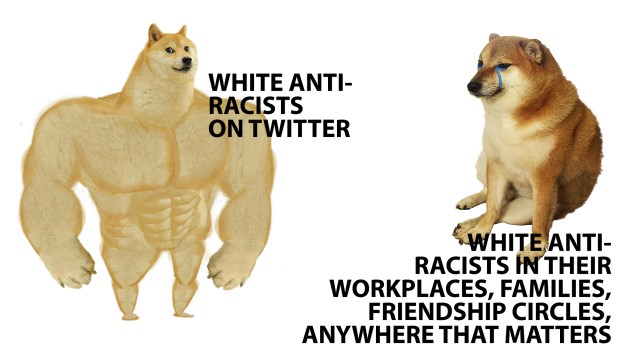
Instead:
Do your due diligence before reposting things. Who is the creator? Are they vouched for by people in the community? Have you thought deeply about the message? Is it actually useful? It’s better to say nothing than to blindly post something that sounds woke but is actually harmful (like claims about “outside agitators”).
Support organizations/writers/creators/etc. who have been doing the work for a long time and don’t get the love they need, instead of adding your own ideas/thoughts/creations into the mix. Analyze whether you’re being as anti-racist in real life — where it might matter more — as you are online.
Also, take stock of your social media feeds. Who do you follow? Is it all people who look like you? Are at least 50% of the accounts you follow run by/consistently feature marginalized people? Include disabled folks, fat folks, immigrant folks, people of color, low-income folks, trans folks, and other under-represented groups in this analysis. Here are some ideas. Make sure there’s some Black joy on your feed too! Social media algorithms systematically silence under-represented voices. You will have to go out of your way to intentionally shift the media you consume. Take this beyond social media too. What are you reading? Watching? Listening to?
Tokenizing Your Friends
A few weeks ago, every fashion brand’s social media accounts posted whatever images they could find featuring Black models. Check the post history, though — it was 99% white models before that, and they’re already right back to business as usual. Don’t do this.
Likewise, I’ve gotten quite a few requests for my Venmo over the last couple months. I’m probably the only trans woman of color these people know — that’s likely a problem in and of itself — and people feel compelled to give me money. I try to redirect it to someone who’s actually struggling right now. I’ve also gotten a few vague platitudes from acquaintances, and I’m sure a lot of Black people have. This feels pretty weird. I don’t want your words; I want your actions!
Instead:
If you weren’t donating or sending messages of love and support before, it’s going to feel disingenuous now — like a brand trying to ride the trend. Still do it; it’s always nice to give people money and send them messages of love — but the proof will be in what this looks like long-term. Do you consistently affirm and support these people in your life? Call out bullshit in your sphere of influence and wield the privilege you have against oppression? Do your marginalized peers know you can be trusted because of your history of anti-oppression behavior? If not, work on that. It’s going to be a long process.
Your friends of color are individuals. Some of them might need you to be there for them emotionally right now, some might need your money. Some won’t want either. If you don’t know how to be supportive of your friends of color during a moment like this, accept that you aren’t as close as you might have thought you were. Find out! Likewise, please don’t go seeking out a Black/disabled/immigrant/trans friend like we’re Pokemon. Honest, sincere, diverse friendships will grow organically.
If you don’t have a lot of close friends who are different than you, analyze why that is. What is it about what you’re looking for in friendships/dates/places to hang out (including online)/etc. that leads to this outcome? Do you have internalized racism/sexism/transphobia/ableism to unpack?
And if you’re a “maker” or whatever, please don’t make BLM earrings or posters or anything like that. Direct anyone you can to makers from the community; I promise you they exist. And don’t make money off of your activism! Just don’t. Why do I have to say this?
Getting Into Online Arguments
If you want to spend your energy engaging with bad-faith actors in pointless arguments, that’s your right, but it’s very unlikely to result in anything productive — and might be counter-productive.
Don’t feed the trolls. They thrive off of upsetting and frustrating people. All of that energy could be used to support and care for people who need it, rather than arguing with people who don’t actually want to learn or grow. Engaging with oppressive ideologies via good-faith argumentation can actually serve to validate those ideologies when what they actually probably deserve is scorn, indifference, or dismissal.
It also can be a form of virtue signaling. You might feel like you’re “fighting the good fight” when you spend hours arguing with racists online, and you likely hope that other people see you out there calling people out. But has all of your fighting actually done people of color any good? Probably not. So you feel good, but have accomplished nothing — the essence of performative allyship.
Instead:
Focus on productive, positive action and on working with people who are within your sphere of influence. Talk to your family and friends about racism, and maybe get into productive conversations with people who seem genuinely interested to learn.
Having Protest Envy
While protests/demonstrations are one of the most visible forms of activism — that’s kind of the point — they are, to be honest, often one of the least effective. Unless they include genuine displays of power or are completely un-sanctioned by police, what are they other than performative? A demonstration is supposed to demonstrate the power of the people. If the first few days of the recent uprising hadn’t included so-called “violence,” “looting,” “property destruction” or “riots,” I’m willing to bet nothing much would have come of them.
There are so many ways to be a part of the movement. Don’t let this article (or any other) convince you that there’s only one “right” way to be an activist.
Instead:
Use your sphere of influence to do what you can. A currently popular way to think about this is Deepa Iyer’s “Social Change Ecosystem;” what’s your role?
Accepting Easy/Mainstream Answers
If any mainstream TV personality, or a congressperson, has also suggested your activism or diversity/inclusion strategy, it’s very likely that it’s meaninglessly performative at best and actively insidious at worst (see: hate crime laws and Democrats in Kente cloth kneeling in support of a police reform bill that does not engage with the specific, clear asks protestors have been making).
Hiring a “Chief Diversity Officer” or creating a committee of token POC isn’t good enough. Think bigger!
Instead:
If you work for an organization or company, pay a consultant to come and tell you the truth about all the ways you’re fucking up (I will do this, I charge a lot, and I’m excellent at it, by the way; e-mail me). And whatever seems like the easiest solution, immediately discount it.
Find the hardest, most radical solution (Dismantle the entire hierarchy of the organization, fire the whole C-suite, and start from scratch as a co-op? Create multiple highly-paid diversity, equity, and inclusion officers with real power to shake things up? Unionize? Put in a by-law that no staff person can be paid more than 2x any other staff person? Etc.) and work from there!
What would be the most transformative solution? Why can’t you do that? No, really, figure out why. Find out who is resistant and why. That’s the only way your organization will ever be truly diverse or inclusive.
We also have to do this in our families, friendship networks, community organizations, schools, social media platforms, etc. And — we have to do it with ourselves.
Avoiding The Hard Conversations With Ourselves
We often look to systems of oppression, “the man,” Trump, Karens, and police officers and shake our fists angrily, imagining that if only they could be subdued or disempowered, everything would be so much better. And it would, but … would it? What did you believe about the world before you were “woken up” to the truth, and how were you taught that? Was it all unlearned in a single moment? We still have to unlearn all of those things, and some of them are so deep we don’t even recognize them.
Instead:
Ask yourself, all the time, a bunch of hard questions: How do you police yourself and others? It’s one thing to hold the criminal justice system accountable for treating people as disposable, for forever dehumanizing those who have transgressed a norm as a subclass unable to get normal jobs or vote, for punishing people in need instead of helping them get their needs met. But do you do the same thing in your own life?
Do you hold grudges? Quickly cancel people who actually have the capacity and/or willingness to learn from their mistakes and do better? Punish those who have wronged you? Get pleasure from the downfall of people you don’t like? Or value people only for the value they bring to your life rather than because they are human beings? None of these have easy answers, but are your answers to these questions aligned with your values and politics?
What are your internalized racisms? How have you benefited from white supremacy, consciously or unconsciously? Think long and deep about this. We have to make Black lives matter in our day-to-day lives, which means unlearning white supremacy. Look back to your upbringing, your immediate family’s, your ancestors. What does that legacy mean? How can you work to rectify it if necessary? What would it take, in the life of one individual, to manifest reparations for generations of white supremacy? Maybe it’s impossible. Maybe it’ll take your whole life.
How do you take affirmative action in your own spheres of influence? How do you redistribute your own wealth? How do you give Black trans women their roses, every single day, even if just for a fraction of your mind’s energy and thoughts?
The moment is over, but the movement continues. We have to work on building and living the systems that we imagine we’d like to one day be the systems we live within.
There are countless other examples — we have to unlearn everything — but this is maybe the most important step. We have to re-train ourselves to love each other, to hold each other accountable in a constructive, not punitive, way, to depend on and care for each other. We’ve grown up in a system that has actively discouraged these things. We’ve been taught that carceral punishment is normal, that private property is normal, that in-group solidarity and out-group mistrust is normal, that nuclear families are normal, etc. We have to unlearn, or at least interrogate, everything.
The only way to truly be a part of the movement is to live it, more and more, every day. If we talk about justice, and love, and freedom, and we want to dismantle these systems … what will we build in their place? And are we ready? How do we prepare for something we can’t really imagine and have never truly spent time and energy preparing for?
The moment is over, but the movement continues. We have to work on building and living the systems we imagine we’d like to one day be the systems we live within. Which means asking ourselves a lot of incredibly difficult questions, and working day by day, for the rest of our lives, to resist and relearn and decolonize.


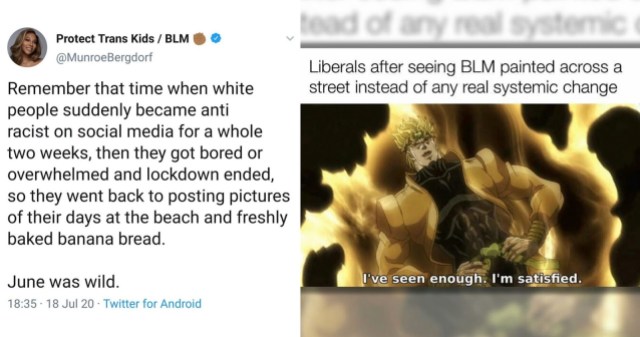
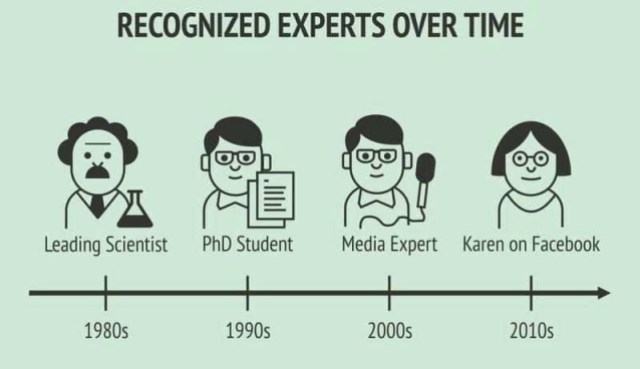
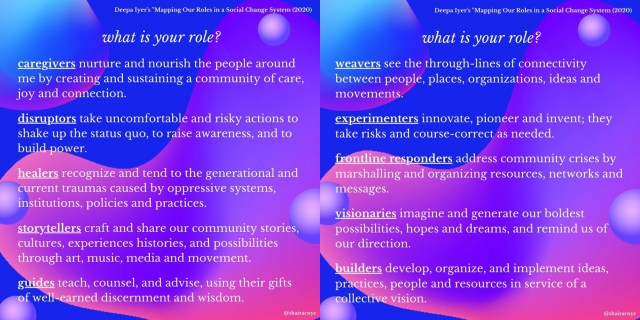
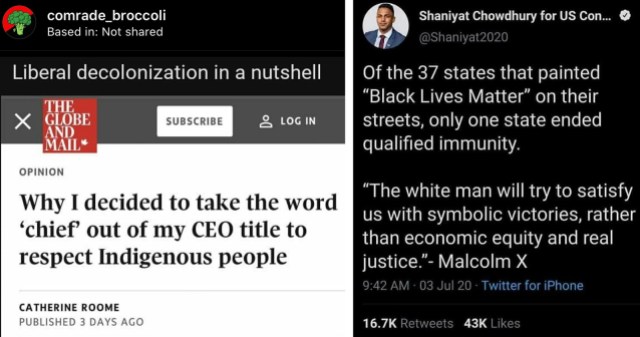

Thank you Abeni!!! Thanks for including reparations and redistributing wealth. In my experience, I need to do it in a community where we can challenge each other and hold each other accountable. I found that in https://resourcegeneration.org/. Would highly recommend for anyone US people who are not feeling financial strain right now.
Thank you Abeni!
Damn. This is such an excellent post. Thank you, thank you, thank you!
Thank you for this, Abeni! It is an excellent guide, and a timely reminder to be thoughtful about how I provide allyship and support.
Thank you for this, it’s excellent and I’m looking forward to reflecting on it and sharing it.
abeni, i’m consistently so grateful for your skill at breaking down big, abstract ideas into material and legible information, and your compassionate, direct writing voice; i’d love to grow to be more like you as a writer and thinker. thank you for this, I know i’ll be coming back to refer to this again and again, and so will others.
Lots to think about, thank you
This was such an insightful article and one I know I will return to many times over the coming weeks.
I’d be interested to know your thoughts on how we deal with corporations who continually fail to tackle their own systemic racism, or worse, actively contribute to racial profiling. I’m thinking specifically of Amazon here (and it saddens me daily that such a welcoming, inclusive, safe space as Autostraddle continues to associate with and promote such a morally bankrupt organisation) but many others. Of course voting with our wallets is not enough in and of itself but to me it has always been an important step.
I honestly don’t know. My feeling is that it’s fruitless to expect corporations to do anything but seek profit. 99% of the time, if they support a cause it’s because they believe it’s in their best interest profit-wise.
I think “voting with one’s wallet” is fine to feel a sense of personal integrity but I don’t think it really does anything. I don’t believe there’s anything like ethical consumption in a capitalist system.
Only a large-scale, organized, long-term boycott of a corporation could really have any effect, but we’ve seen with Facebook that even massive boycotts don’t do much when you’re that big, and small businesses that don’t have the means to boycott won’t do it bc there aren’t any other options. Same with low-income people who have to shop at Amazon/Walmart/etc. because of shipping rn during COVID or otherwise just because it’s cheap and capitalism has forced them to find the lowest prices in order to survive despite the externalities / “unintended” consequences.
I believe government regulation is probably the only legal way to really deal with it, so voting progressive lawmakers in and corporatists out is really the best bet? Probably?
The other option is violent insurrection. But that’s unlikely…
Now, I don’t know about AS’s affiliate policy but I DO know that a while back we switched many affiliate links away from Amazon (I know we’ve been using Bookshop for books at least) but I’m not 100% on how all of that works.
It’s probably a similar catch-22 though: are more of our readers likely to use a Bookshop affiliate link or an Amazon one? Meaning, from which link are we likely to actually get a little affiliate kickback? As you know, we’re fundraising and trying to get every dollar we can to survive. Does aligning with evil empire in order to keep our tiny little community alive make sense? I don’t know, but I don’t think it’s as simple as “it’s better to fail than to have less than 100% pure ideological partnerships.” AS is trying to survive and keep this “welcoming, inclusive, safe space” alive for everyone.
I’m just a writer so I’m not involved with that at all, but I imagine it’s a pretty tough tightrope to walk.
This was a really great guide, Abeni. I’m so thankful for the clarity of purpose you always bring to the table.
I’ll definitely use this to check myself on deepening my allyship in meaningful ways and it’ll be my go-to when I get another e-mail from a white person about the latest traumatic black event.